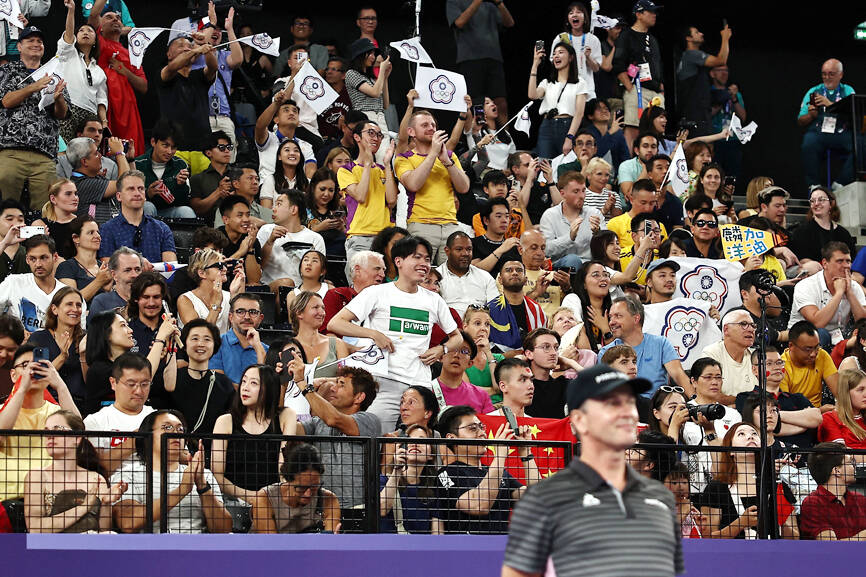More Taiwanese spectators at the Paris Olympics have reported having signs and banners confiscated by security staff or snatched by Chinese fans.
Sandy Hsueh (薛雅俶), president of the Taiwanese Association in France, said that three security personnel confiscated a blank piece of cardboard from her at Sunday’s men’s doubles badminton final, in which Taiwan’s Lee Yang (李洋) and Wang Chi-lin (王齊麟) defeated China’s Liang Weikeng (梁偉鏗) and Wang Chang (王昶) to win their second consecutive Olympic gold medal in the event.
A staff member told her they had “received an instruction from the Olympic Games saying that anything related to Taiwan or showing Taiwan cannot appear,” Hsueh said.

Photo: Ann Wang, Reuters
“Obviously we were targeted because Chinese fans were sitting in the front row seat on the lower level holding a Chinese national flag that exceeded the size allowed by the IOC” (International Olympic Committee), she said.
Although she reported the oversized Chinese flag, she said venue staff took no action over the banner.
Many spectators recorded evidence of a Chinese woman holding a mobile phone, who stood next to the security personnel and directing them to confiscate signs and banners from Taiwanese supporters, Hsueh said.
Another supporter took pictures of the woman thanking the staff and volunteers after the game and giving them badges, she said.
The incidents follow similar scenes during Lee and Wang’s semi-final on Friday, when a Taiwanese spectator’s banner was snatched by an unidentified man, who was reportedly ejected by venue staff.
At the same event, a towel with the word “Taiwan” printed on it was confiscated from a Taiwanese supporter by venue staff.
Hsueh said she believes that China’s interference has gone beyond the scope of the IOC framework on fairness, inclusion and nondiscrimination.
A Chinese human rights advocate who asked not to be identified said that the government in Beijing dispatches people to Olympic events in which Taiwan participates to scrutinize flags and report them to the IOC.
Under IOC rules, spectators are prohibited from displaying flags or signs with political messages or that support entities not competing in the Olympics.
Taiwan has participated in the Olympic Games as “Chinese Taipei” since 1984, with athletes competing under the Chinese Taipei Olympic flag. Prior to that it participated as “Formosa” and “Taiwan.”
“When facing the Chinese team, the IOC will treat Taiwan very harshly. Five-star [Chinese] flags were everywhere in the stadium, but our signs bearing even the words ‘jia you’ [加油, an expression of encouragement] were taken away,” Representative to France Francois Wu (吳志中) said on Sunday.

Taiwanese can file complaints with the Tourism Administration to report travel agencies if their activities caused termination of a person’s citizenship, Mainland Affairs Council Minister Chiu Chui-cheng (邱垂正) said yesterday, after a podcaster highlighted a case in which a person’s citizenship was canceled for receiving a single-use Chinese passport to enter Russia. The council is aware of incidents in which people who signed up through Chinese travel agencies for tours of Russia were told they could obtain Russian visas and fast-track border clearance, Chiu told reporters on the sidelines of an event in Taipei. However, the travel agencies actually applied

Japanese footwear brand Onitsuka Tiger today issued a public apology and said it has suspended an employee amid allegations that the staff member discriminated against a Vietnamese customer at its Taipei 101 store. Posting on the social media platform Threads yesterday, a user said that an employee at the store said that “those shoes are very expensive” when her friend, who is a migrant worker from Vietnam, asked for assistance. The employee then ignored her until she asked again, to which she replied: "We don't have a size 37." The post had amassed nearly 26,000 likes and 916 comments as of this

New measures aimed at making Taiwan more attractive to foreign professionals came into effect this month, the National Development Council said yesterday. Among the changes, international students at Taiwanese universities would be able to work in Taiwan without a work permit in the two years after they graduate, explainer materials provided by the council said. In addition, foreign nationals who graduated from one of the world’s top 200 universities within the past five years can also apply for a two-year open work permit. Previously, those graduates would have needed to apply for a work permit using point-based criteria or have a Taiwanese company

The Shilin District Prosecutors’ Office yesterday indicted two Taiwanese and issued a wanted notice for Pete Liu (劉作虎), founder of Shenzhen-based smartphone manufacturer OnePlus Technology Co (萬普拉斯科技), for allegedly contravening the Act Governing Relations Between the People of the Taiwan Area and the Mainland Area (臺灣地區與大陸地區人民關係條例) by poaching 70 engineers in Taiwan. Liu allegedly traveled to Taiwan at the end of 2014 and met with a Taiwanese man surnamed Lin (林) to discuss establishing a mobile software research and development (R&D) team in Taiwan, prosecutors said. Without approval from the government, Lin, following Liu’s instructions, recruited more than 70 software